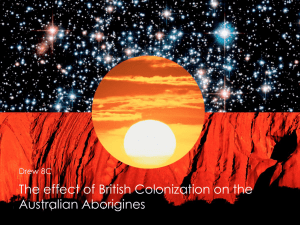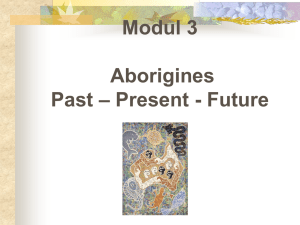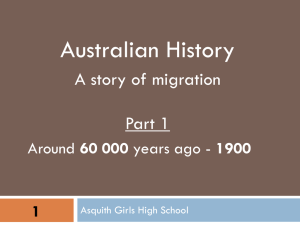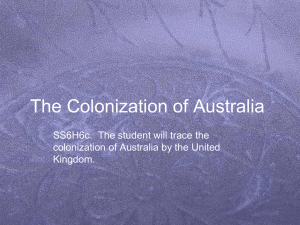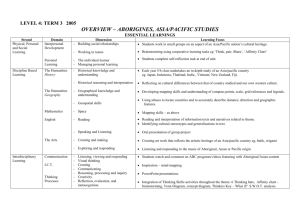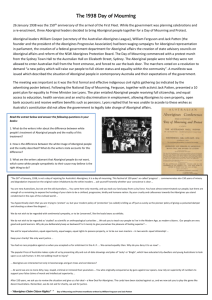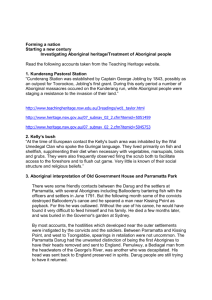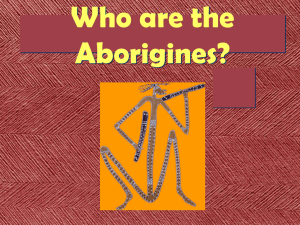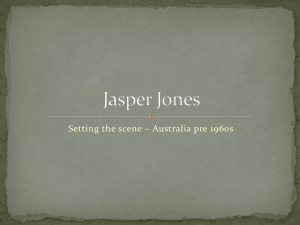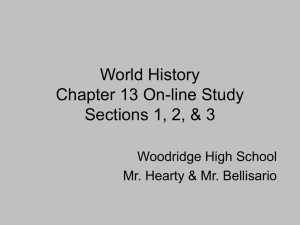Aborigines (cont`d)
advertisement
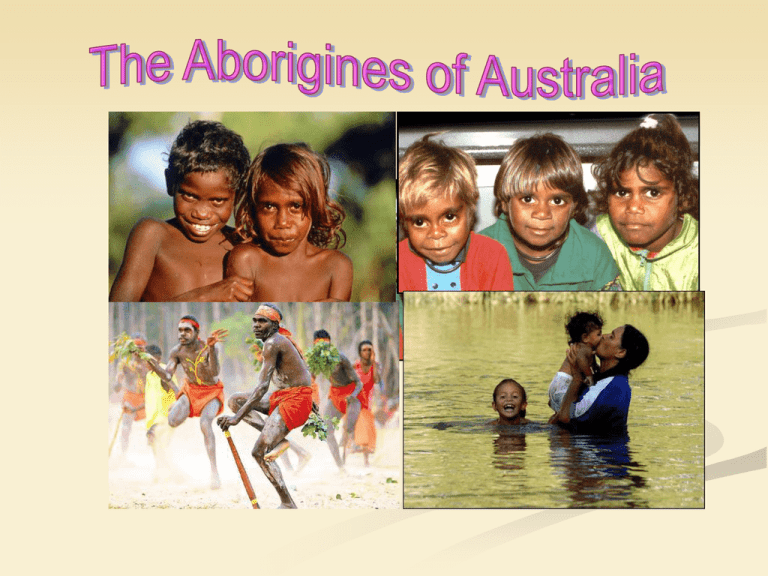
The Aborigines are the Australian natives that have been living there for thousands of years before the first Europeans came to Australia in the 1700s. Diversity of Aborigines There is great diversity among different Indigenous communities and societies in Australia, each with its own unique mixture of cultures, customs and languages. In present day Australia, these Aboriginal groups are further divided into local communities. With this mind, we must be careful not over generalize the Aboriginal culture. Aborigines (cont’d) The word “Aborigine” comes from a Latin word meaning “from the beginning.” Scientists believe that Aborigines traveled to Australia from Southeast Asia on boats via a land bridge over 40,000 years ago. CORE BELIEF SYSTEM “Dreamtime” is at the center of the Aborigines belief system and describes the mystical time when the Aboriginal people established their world. “Dreamtime” explains the origins of the people and of the land. Dreamtime includes a story of how things have happened, how the universe came to be, how humans were created, and how the Creator intended for humans to function in this world Food of the Aborigines Until about the 1700’s the Aborigines the Aborigines lived in the Australian deserts where no one location provided enough food for them. Because of this they were constantly on the move always hunting for their next meal. Types of animals hunted: kangaroos, birds, bats, and fish Hunting tools: the boomerang & spear Other food was collected from the land Hunting (cont’d) THE BOOMERANG: HUNTING VIDEO: http://www.youtube.com/watch?v=9DDHxOq FkAs Shelter Aboriginal people built simple shelters that changed season to season. Trees were chosen as a primary resource because they could provide natural windbreaks and shade. The trunks also provided sturdy material. Walls of the shelters were often decorated by finger painting. Language There were over 250 Aboriginal languages in Australia before European settlement. Today, about 100 of those still exist. One of the languages that has been recorded and is still in use to today is Wajarri. The Wajarri language is very different from English and many of the sounds in Wajarri do not exist in English… no letters in our alphabet for Wajarri sounds. Speak Wajarri! (or try…) English Mom Tomorrow Hungry Sun Night Time Look out! Go Away! Wajarri Yagu Mungal Nyarrun Garangu Marungga Balayi! Yanma! Clothing The types of clothing worn was influenced by the different weather conditions: MEN: wore “girdles” which were made from fur or twine. WOMEN: typically wore something that resembled an apron made out of leaves and possum skin. After European settlement women began covering themselves more. Decorations (including white paint) were worn by both men and women. Clothing (cont’d) Music and Dancing The traditional music of indigenous Australians holds a lot of meaning to their culture. Music is used throughout an aboriginal's life to teach what must be known about their culture, about their place in it, and about its place in the world of nature and super nature. As a very young child, the aboriginal is encouraged to dance and sing about everyday tasks. Music and dancing are often used as a means of communication. Music and Dancing (cont’d) The Didgeridoo is a wind instrument developed by the Aborigines at least 1,500 years ago and is still in widespread usage. It is sometimes described as a natural wooden trumpet The instrument is traditionally made from Eucalyptus trees which have had their interiors hollowed out by termites or died of other causes. Didgeredoo Music/Dancing videos Music: http://www.youtube.com/watch?v=DC9w4K WEgJE Dance: http://www.youtube.com/watch?v=cQGApoH MZYI History- European Settlement Captain James Cook discovered Australia in 1770. He was sent to discover the huge land that many people believed was south of the equator. He landed south of present day Sydney in New South Wales. He claimed this part of the land for the King of England. European Settlement (cont’d) Europeans stole Aboriginal land and killed thousands of Aborigines. They also brought new diseases with them Which killed off a lot of the Aboriginal population. In 1770, there were about 300,000 Aborigines. Now, there are 120,000. It is becoming harder and harder for Aborigines to continue their traditional way to live. During the early 1900’s the white Australian government enacted and enforced removal policies that continues to affect the Aborigines today…

